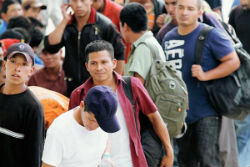A new United Nations report highlights skyrocketing rates of forced displacement in Central America’s Northern Triangle region, attributing the trend in large part to rampant organized crime related violence.
In its latest annual Global Trends report (pdf), the Office of the United Nations High Commissioner for Refugees (UNHCR) says the number of asylum-seekers from the Northern Triangle countries of Honduras, Guatemala, and El Salvador rose from 20,900 in 2012 to 109,800 in 2015 — a more than five-fold increase.
The report suggests a toxic mix of local gangs and transnational drug trafficking groups is driving much of the displacement.
“Violence and persecution generated by transnational organized crime, gang-related violence, and drug cartels in some parts of Central America are likely to be the primary cause behind the increasing numbers of asylum-seekers from Central America seeking international protection in the United States of America,” the report reads.
The most common destination for Northern Triangle refugees is the United States, where 18,900 asylum seekers from El Salvador registered in 2015, 16,400 from Guatemala and 14,300 from Honduras.
The sharp growth in the number of asylum-seekers from the Northern Triangle contributed to a 17 percent increase in displacement across the Americas, according to an accompanying UNHCR press release. The report found that a record-setting 65.3 million people were forcibly displaced from their homes worldwide in 2015.
InSight Crime Analysis
Although the UNHCR has reported several times on Central America’s growing displacement problem, this report draws perhaps the clearest link yet between forced displacement and organized crime.
Previous UNHCR reports have attributed displacement to criminal gangs, but also to broader factors like high levels of overall crime and violence as well as poverty and unemployment. It appears governments and international organizations are becoming increasingly aware of how organized crime, and not just internal conflict, fuels displacement in the region.
SEE ALSO: Coverage of Displacement
Although this distinction may seem academic, it could potentially have a large impact on how migrants’ asylum claims are processed once they reach the United States. For instance, in January US Secretary of State John Kerry announced the Refugee Admissions Program would be expanded to accept more asylum-seekers from the Northern Triangle.
At the same time, however, the US government has stepped up deportations of Central American refugees, while Mexico is also stopping a greater number of child migrants before they even reach the US border.

